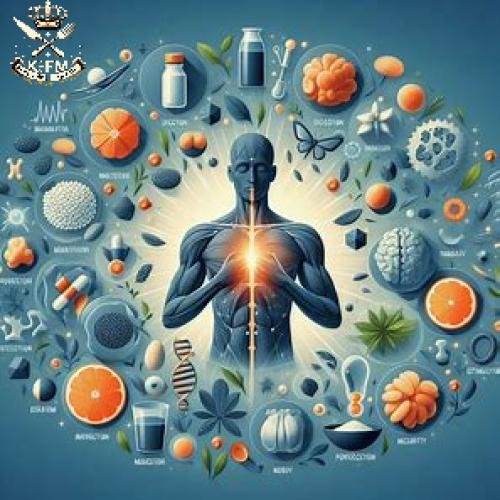Stress and Tension: Its Effects on the Body and Skin
Stress and tension have become some of the most common problems in modern human life. Stress might seem like a normal occurrence at times, but when it persists for extended periods, it has significant negative effects on overall health, including the skin, hair, immunity, and even internal organs such as the stomach and heart. In this article, we will discuss the impact of stress on general health and how to avoid it through techniques like yoga, breathing exercises, and better life management.
The Effects of Stress on Skin, Hair, and Immunity
Effects of Stress on the Skin
When the body suffers from chronic stress, hormones like cortisol and adrenaline are excessively released. These hormones negatively affect the skin by increasing oil production, which leads to clogged pores and acne. Additionally, stress may cause skin dryness and the early appearance of wrinkles.
Effects of Stress on Hair
Stress also directly affects hair health. Stress can cause sudden hair loss due to its impact on blood circulation, which nourishes hair follicles. In cases of chronic stress, a person may experience a condition known as "telogen effluvium," where hair loss is significant.
Effects of Stress on Immunity
Chronic stress can weaken the immune system, increasing the likelihood of getting sick. As a result, the body becomes more susceptible to viruses and bacteria because the immune system cannot function fully when stress levels are high.
Effects of Stress on the Stomach and Heart
Continuous stress can affect the digestive system, leading to issues like stomach ulcers, digestive disorders, and even irritable bowel syndrome. On the other hand, chronic stress increases blood pressure and puts additional strain on the heart, heightening the risk of cardiovascular diseases.
Stress and Cancer
Chronic stress may increase the risk of certain types of cancer. This is because prolonged stress leads to the release of chemicals that can contribute to tumor growth or exacerbate the condition in people with existing tumors.
How to Avoid Stress Through Yoga and Breathing Exercises
Yoga and Its Impact on the Body
Yoga is an ancient technique that combines deep breathing with physical movements aimed at restoring mental and physical balance. By practicing yoga, the body is encouraged to relax, which leads to reduced cortisol levels and consequently reduces stress and tension.
Breathing Exercises and Their Benefits
Breathing exercises, such as deep breathing (which involves slow inhaling and exhaling), are an effective way to reduce stress. These exercises activate the sympathetic nervous system, which helps the body relax. In general, practicing breathing exercises daily can alleviate stress, improve sleep quality, and reduce feelings of anxiety.

How Poor Life Management Contributes to Stress
One of the main causes of stress is poor daily life management. The accumulation of tasks and daily pressures can lead to mental and physical exhaustion. To avoid this, it is important to organize time and prioritize tasks. Breaking down large tasks into smaller, less complicated ones can also help reduce stress caused by feeling overwhelmed.
Exercises to Reduce Overthinking
Overthinking can be a habit developed from childhood or a result of a personality that tends to overanalyze. Overthinking can significantly increase stress as it causes constant feelings of pressure and anxiety. Here are some exercises that can be practiced daily to reduce overthinking:
- Meditation Exercise: Sitting in a quiet place and focusing on your breathing can help clear the mind from racing thoughts.
- Daily Writing: Writing down thoughts and feelings can help organize the mind and lighten the mental burden.
- Physical Exercises: Engaging in daily physical activity, such as walking or running, can help reduce stress and bring focus to the present moment.
To reduce overthinking and stress, categorizing goals into four categories can be helpful:
- Important and Urgent Goals: These are tasks that need immediate attention, such as work or daily activities that require quick completion.
- Important but Not Urgent Goals: These include long-term objectives, like self-development or gradually improving health.
- Not Important but Urgent Goals: These are tasks that may seem necessary but are actually not of great importance.
- Not Important and Not Urgent Goals: These are the tasks that can be completely ignored as they don’t add significant value to our lives.
Promoting Positive Thinking
It’s essential to continue saying positive affirmations to yourself, such as:
- “I don’t want to continue thinking about this.”
- “I deserve to live a happy life.”
- “Happiness lies in the small things.”
- “Daily gratitude helps me focus on the positives.”
Additionally, the "countdown method" (counting backward from 100 to 1) can help reduce overthinking and achieve mental relaxation. The countdown is a way to calm the mind and focus.
The Role of Food in Reducing Stress
Proper nutrition plays a crucial role in reducing stress and improving overall health. Foods rich in omega-3s, such as fish and nuts, help decrease stress. Consuming magnesium-rich foods like leafy greens can aid in relaxing muscles. Avoiding caffeine and sugary drinks can also help lower stress levels and promote better relaxation.
Frequently Asked Questions
- How can I relieve stress quickly? You can quickly relieve stress by practicing deep breathing exercises, doing yoga, or listening to soothing music.
- Does stress affect the immune system? Yes, chronic stress weakens the immune system, making the body more susceptible to illnesses.
- Is yoga helpful for stress relief? Yes, yoga helps reduce stress through physical and breathing exercises that calm the nervous system.
- How can I organize my life to reduce stress? You can organize your life by setting priorities, breaking large tasks into smaller ones, and ensuring you allocate time for rest.
- What effect does food have on stress? Food has a significant impact on stress; omega-3 and magnesium-rich foods help reduce stress, while caffeine-rich foods may increase it.
Conclusion
Stress and tension have negative effects on overall health, including skin, hair, immunity, and internal organs. By practicing techniques such as yoga and breathing exercises, as well as improving daily life management, we can effectively reduce stress levels. The importance of food in enhancing stress resilience should not be overlooked. Following these tips can lead to improved general, mental, and physical health.




















